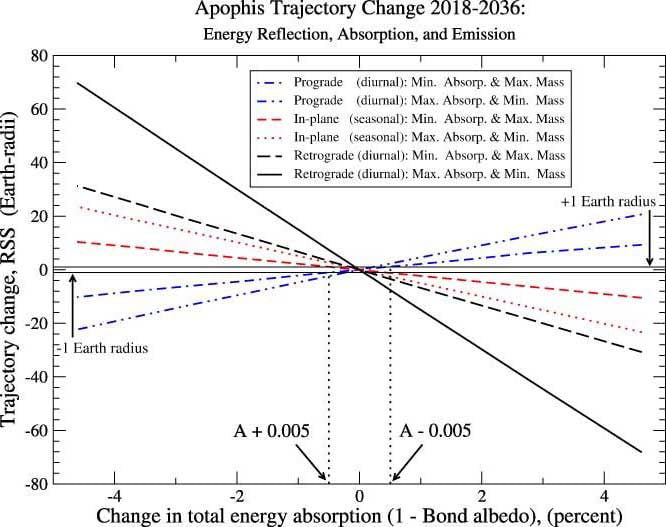[/caption]
According to a
Russian news story,
a report just released by the
Russian Academy of Sciences
suggests sending a satellite with a radio beacon to asteroid 99942 Apophis for better determining its trajectory and finding out how big of a threat it might be to Earth in passes the asteroid will make in 2036 and 2068.
"From the technical point of view, the mission could be started for implementation from 2015," the Academy said in the report.
Apophis is expected to make a record-setting — but harmless — close approach to Earth on Friday, April 13, 2029 when it comes no closer than 29,450 km from Earth (18,300 miles), well within the orbits of geostationary satellites. Astronomers have ruled out any possibility of an impact in 2029, but that close pass could alter its trajectory for subsequent close passes. Right now, astronomers estimate the probability of Apophis impacting Earth on its following pass in 2036 is about 1 in 250,000. Another encounter by the asteroid with Earth in 2068 currently has a chance of impact at approximately 1 in 333,000, as of the estimates released in October of 2009.
Like all preliminary estimates, NASA says it is expected that the 2068 encounter will diminish in probability as more information about the 2029 pass by Apophis is acquired.
The Russian report said the core target of the possible mission would be to clarify the exact trajectory of Apophis for up to 2036. The satellite could be equipped with a radioisotope power source with a buffer battery.
Other scientists
have suggested missions
to place equipment on the Apophis' surface, which could for the first time study an asteroid's interior. Because the torque caused by the Earth's gravitational pull will cause surface and interior disruption to Apophis, scientists have a unique opportunity to observe its otherwise inaccessible mechanical properties.
Apophis is approximately 270 meters (885 ft) in diameter, the size of two-and-a-half football fields.
Initially, when first discovered in 2004, Apophis was thought to have a 2.7 percent chance of impacting Earth in 2029, but as scientists have made better and more detailed observations, they were able to recalculate the path of Apophis, determining that there was no chance it would hit Earth in 2029 and significantly downgrading the odds of it hitting Earth on future passes.
"The refined orbital determination further reinforces that Apophis is an asteroid we can look to as an opportunity for exciting science and not something that should be feared," said Don Yeomans, manager of the NEO Program Office at JPL. "The public can follow along as we continue to study Apophis and other near-Earth objects by visiting us on our
AsteroidWatch Web
site and by following us on the
@AsteroidWatch Twitter feed
."
See more information from NASA's NEO office.
 Universe Today
Universe Today
